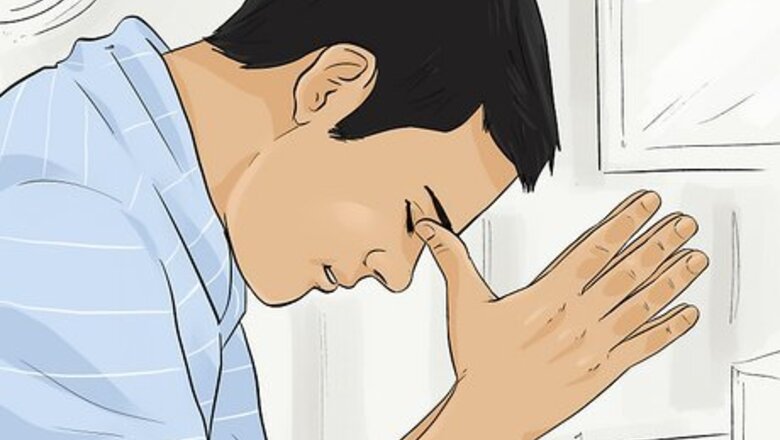
views
Coping in the Moment
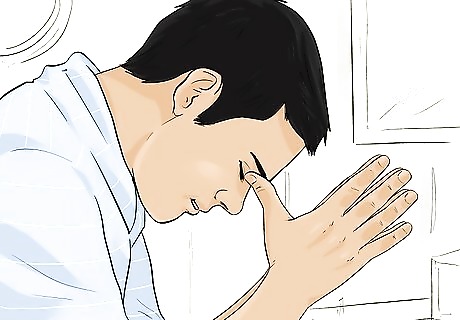
Keep your composure. When someone snubs you, it can be hard to stay calm. This is especially true if you've been snubbed by this person before. Instead of reacting with negativity, take a deep breath and try to view the situation objectively. What is there to gain from reacting in the moment? If someone is aggressive and rude by nature, they probably thrive on a reaction. Do not give them that satisfaction. React only if it's absolutely necessary and don't jump into any conclusions. If someone addresses you in a condescending way, for example, you may have to respond. However, do so without getting angry. If necessary, try doing something like taking a deep breath and counting to five before addressing the situation. For example, if a coworker says something like, "I would invite you to the bar, but it's not really your scene, is it?" you should stay calm, and respond with something polite like, "Actually, I do like karaoke, but I'm fine sitting this one out."

Try to laugh it off. Try to stay in good spirits when it comes to rude behavior. Meeting fire with fire is only likely to escalate the situation. If someone snubs you, try to laugh off the rebuff instead of returning with catty behavior of your own. Making yourself smile in any situation is actually proven to be calming due to the release of endorphins and serotonin. So, try to smile and offer a fake laugh in response to a rude behavior. For example, say "Funny! I didn't realize I didn't seem like a karaoke person!" Then, laugh and walk away. You may still feel angry. However, the point is to avoid letting the other person know they upset you. They may stop behaving rudely if you don’t give them a reaction. Try to keep your composure in the moment. You can deal with the emotional fallout later.
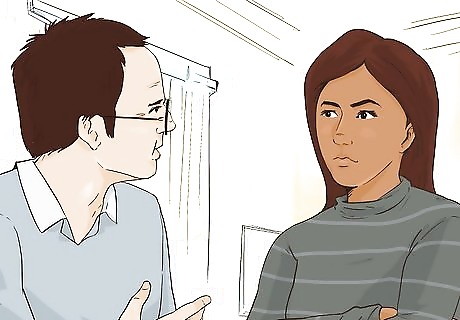
Offer feedback in the moment. If someone is particularly critical, and snubs you frequently, you can try offering polite feedback in the moment. A rude person may not realize they're being rude. If you address the behavior in a calm, productive fashion, that may help lessen snubs in the future. You can teach someone how to treat you via your reactions. If you don't let someone know how you expect them to treat you, they may never learn proper behavior. If someone snubs you, politely address the issue right away. Make it clear you do not find the snubbing appropriate, and how you wish it would change in the future. You do not need to be hostile. In fact, it's not productive to do so. Simply state your feelings out right. For example, "You know, I feel left out when you assume something isn't my scene. I do enjoy going out as much as the other people in the office, so next time, can you just ask me if I like karaoke instead of making assumptions? I would really appreciate that." After politely speaking your piece, it can be helpful to excuse yourself from the conversation. This will give the person time to think about what they've said or done and to prevent any defensiveness from creating an argument.

Think about the big picture. Some people's behavior will not change, and you need to look at the big picture. When snubbing occurs, stay calm and keep things in perspective. Keep your larger life and goals in mind. If one person at work does not seem to like you, is it really a big deal? Do you have positive relationships with other people in your office? Do you feel otherwise secure in your job? If one person in a group does not take to you, does that really affect your relationship with others in the group? Don't you still have an active social life, even if one person is not a fan of you? Recognize that you are not missing out on much by not having a relationship with a rude, judgmental, or toxic person.
Working Through the Situation
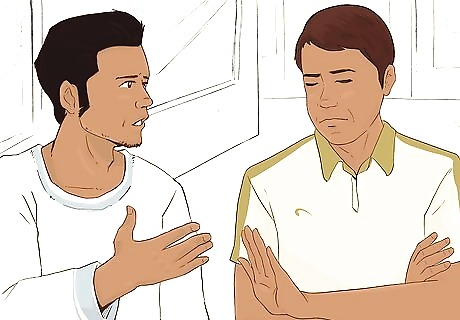
Decide whether a confrontation is worth it. If someone snubs you frequently you may want to sit down with them and talk it out. However, a confrontation is not always worth the effort, especially if this person is not someone you want or need a strong relationship with. Decide whether or not you want to address the behavior in depth before proceeding. Size up how much this person has offended you, as well as the kind of person they are. Someone who snubs you on occasion, but who's just generally rude, may not be worth the time. Some people are simply unpleasant, and it's best to let the behavior go. However, maybe this is a friend or family member you value. They're not usually rude, but seem to be slipping into poor behavior for some reason. In this case, you may want to identify the cause of the snub to try to salvage the relationship. Try your best to empathize with them. What kinds of major stress do they have going on in their lives? Have they had a rough life?
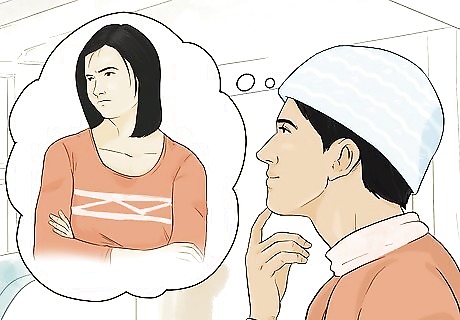
Try to understand the other person's perspective. Sometimes, it can help to try to get inside someone else's head. If you feel wronged or snubbed, stop and try to consider the perspective of the offender. Snubs can often be a matter of miscommunication. They can also be the result of a simple mistake. A friend, for example, maybe just forgot to include you in a group text or assumed someone else would extend an invite to you. Before getting angry, consider the circumstances. You've probably inadvertently snubbed people as well. Sometimes, miscommunication or forgetfulness can cause you to accidentally hurt someone's feeling or leave someone out. Before deciding to approach the situation with anger, look at the other person's perspective. It may be a simple misunderstanding. If that person has shown to be a good friend to you in other ways, try to give them the benefit of the doubt. Think back on the history of your relationship and see if what you're assuming is characteristic of them.
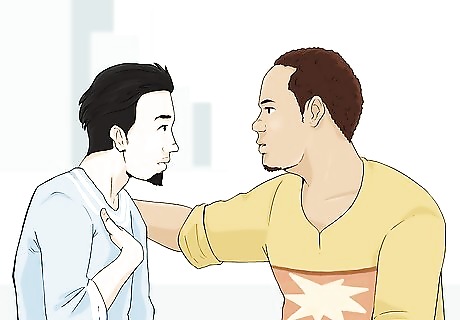
Voice your concerns to others. It can help to talk things out with other people. Before attempting to confront someone who snubbed you, talk to other people. They may have insight on the situation you would otherwise miss. However, you should choose the person with whom you wish to speak with very carefully. Should it be someone completely objective and outside the situation? Or someone who also knows the other party? Either way, select someone you feel you can trust to maintain privacy. Do not think of this as gossiping or badmouthing the other person. Go into the situation hoping to gain insight rather than just vent or express negativity. Say something polite and measured to the person you talk to. For example, "I noticed Sophie invited everyone in the office to her birthday but me. I'm not sure if that was intentional, but I'm a little hurt. She's left me out of stuff before, so do you think I should talk to her?" The other person may offer some insight that can help you decide whether the situation is worth getting upset over. For example, your friend might say, "Oh, Sophie just doesn't think you like her because you're always quiet around her. I know you're just kind of shy, but she interprets that the wrong way."

Address the situation using "I"-statements. If you do end up talking to the person who snubbed you, use "I"-statements. This can help the conversation unfold smoothly, as "I"-statement emphasize feelings over objective facts. They have three parts. They begin with, "I feel..." and then you state your feeling. Then, explain the behavior that led to that feeling. Lastly, say why you feel the way you do. For example, don't say something like, "I hate how you and John always go to the bar without me after class, even though you know I'm free. It hurts to be left out." This sounds accusatory, which could make someone react poorly. Instead, rephrase this using an "I"-statement. For example, "I feel left out when you and John go out after class without me because I don't understand why you don't invite me too."
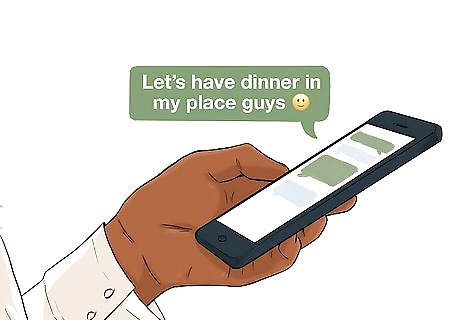
Try to lead by example moving forward. After dealing with the snubbing, try to lead by example. People tend to treat others the way they are treated. If you make an effort to model good behavior, you may receive better treatment moving forward. You should also reward their future good behavior with gratitude and engagement. Try not to let resentment from their past behaviors make you cold toward them. Rude behavior is contagious. If you inadvertently snub a friend, they may snub you back. Try to be aware of your own behavior, and treat others in the manner you wish to be treated. Try to be more inclusive. If you feel you've been snubbed, work on always extending invitations to everyone. Make sure you include all your friends when making plans, and include all coworkers in invitations out. Other people are likely to extend that same courtesy to you.

Push yourself to be more social. Often, snubbing is not about you. However, if you get snubbed frequently, you may be coming off the wrong way. If you're shy or introverted by nature, people may think you're not interested in their friendship. Try to push yourself to be slightly more social. Strive to start conversations with others. Start chatting with a coworker during your break. You can make a comment on a recent assignment to get things going. If someone tries to talk to you, be sure to chat back. Try to spend more time with people. If you're the type to spend lunch alone, try joining your coworkers for lunch. If there's usually a happy hour on Fridays, make the effort to attend. Ask people to do things. If you never invite others out, people may not invite you out. If you feel like you're being snubbed, try initiating socialization for a change.
Avoiding Negative Feelings
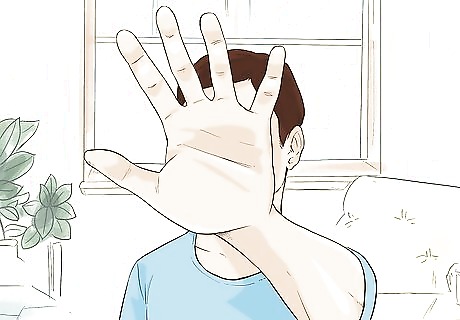
Accept you can't make everyone like you. Some people may simply dislike you or be uninterested in your friendship. Some people will not want to be your friend, or even be friendly towards you. This likely has nothing to do with you. You probably do not like everyone you meet either. Try to let go of small snubs and accept that some people simply will not click with you.
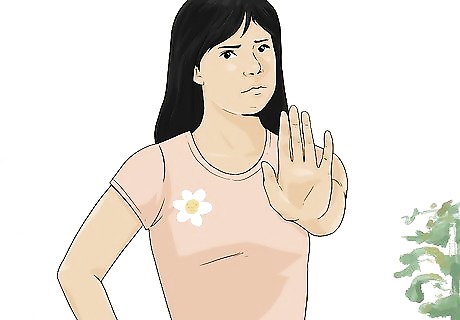
Avoid taking someone else's rudeness personally. If someone is rude to everyone, and not just you, chances are that person has a personal issue affecting their behavior. Maybe that person was not treated nicely growing up. Maybe they never learned how to treat others with respect. If you've been snubbed over and over again by someone, try not to take it personally. While some people are rude by nature, other people may have no intention of snubbing you. The coworker who did not invite you out to barbecue may have done so because you're a vegetarian, for example. Not all snubs are a personal attack.

Take pride in yourself. Too much snubbing can damage your self esteem. You may end up feeling negative about yourself if you feel left out. However, stop and try to reclaim your own sense of self worth. Remind yourself of everything you like about yourself. Actively engage in positive, supportive friendships that make you feel good about yourself. Hopefully, this will lessen the sting of a snub. Think about everything you have to be proud of. Think about positive aspects of your personality, your education, and your skills. Remind yourself of the things you take pride in as a person. Everyone has something valuable to contribute. Just because one person does not value your contributions does not mean you are inherently without value.
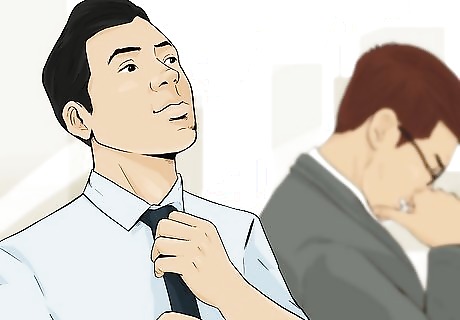
Consider whether you really care about this person's point of view. How important is this person's perspective to you? If the person snubbing you is not someone you're close to, and is generally unpleasant, you do not need their approval. Keep this in mind when dealing with your emotions after being snubbed. There's no sense in letting an unpleasant person dictate your feelings of self-worth.











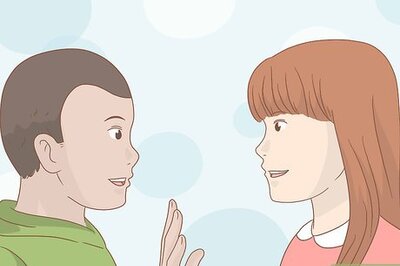





Comments
0 comment